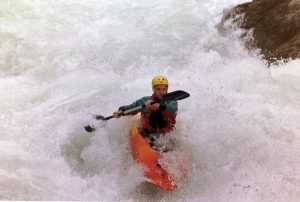I remember around about 1998 before the word ‘blog’ came along (or before I’d heard of it), the name of the game was having a “homepage” and trying to get lots of hits. I had noticed that some websites had me coming back regularly, because they had little news updates, and I pondered the possibility of doing this on my homepage. News about me. Stupid little things which I had been doing, or thinking, or websites I’d been visiting. Entries would get old, so they would have dates on them, and would gradually disappear off into archives. This would give me a nice space for informal outpouring of thoughts, and the hope was that some of my friends would probably pop back every now and then, and maybe some strangers too. Clever idea hey? ….Never got round to doing it though.
Obviously since then the blogging phenomenon has exploded and really carved itself a place in a new knowledge economy, turning ordinary people into a publishers as well as a consumers of news. blah blah blah. I think it’s great. I’ve always thought it was great, and yet somehow I’ve never got round to doing it. I am actually ashamed of myself for not blogging before, but let me give you my excuses:
I prefer wikis
A blog is a rather self-centred personal expression. It’s a one-man effort. OK you’re forming part of a collective conscious known as the blogosphere, but you’re writing words for your own credit. Nobody else will take the credit or the responsibility for them. What’s more you have to find your own inspiration and your own sense of purpose in any blog entry you write. These things are both good and bad, but in any case very different, from the way wikis work.
On a wiki your words are a “contribution” towards a greater purpose. You are building something together with the rest of the wiki community. There is a purpose to unite around, and the whole effort is collaborative and altruistic. To get excited about participating in a wiki, requires a different kind of psychology to blogging. So there’s my excuse. I am more psychologically predisposed to wiki editing than blogging.
….which seems to be quite rare. Most people knew about blogging long before they knew about wikis, but I think I discovered wikis relatively early on in the adoption cycle. These days wikis and blogging are lumped together in the nebulously defined “web 2.0” or “the participatory web” as I prefer to call it. People are coming to understand the value of wikis, and can sense the power which could perhaps be harnessed (or commercially exploited) somehow, but how many people actually get stuck in a make lots of wiki edits? It seems like self-centred blogging is more popular (and a more prevalant psychological trait) than altruistic wiki barn-raising.
Blogging software choices
My second excuse: While considering starting a blog, I have been boggling my mind with a myriad of complex software choices. On at least two occasions I have gone to the drawing board with a plan to build bespoke blogging software, and I did actually start coding something (from scratch) on at least one ocassion. There’s a number of feature ideas I had at various stages, which were not available, or not available together. ‘bliki’ functionality is one example (fusion of wiki and blogging modes of publishing) The integration can happen at many different levels. I investigated the idea of blogging from within a MediaWiki installation. Still quite like this idea actually. But using a wiki to do blogging is inelegant for several reasons. Mainly I would be missing some more advanced pure blogging features such as ‘trackbacks’ and ‘RSS’ (per post basis) Equally to build a blogging system from scratch would leave me missing these advanced features, unless I spent a lot of time re-inventing the wheel.
I’ve finally shelved all my half-baked plans and just whacked a wordpress installation on here on the basis that
A) I will probably never get time to finish developing a blogging system from scratch
B) I will probably never have time to install/develop/test MediaWiki plugins to acheive decent blogging functionality.
C) If I do finally get around to doing any of that, I can migrate. It’ll cause some URL upset, but it’s not the end of the world. I need to start creating blog content before I worry so much about how exactly to present it.
Obvious really, when I think about it. But then again it seems sad to turn down the opportunity for a bit of fast paced web hackery. Cobbling together something in PHP is an attractive alternative for me.

